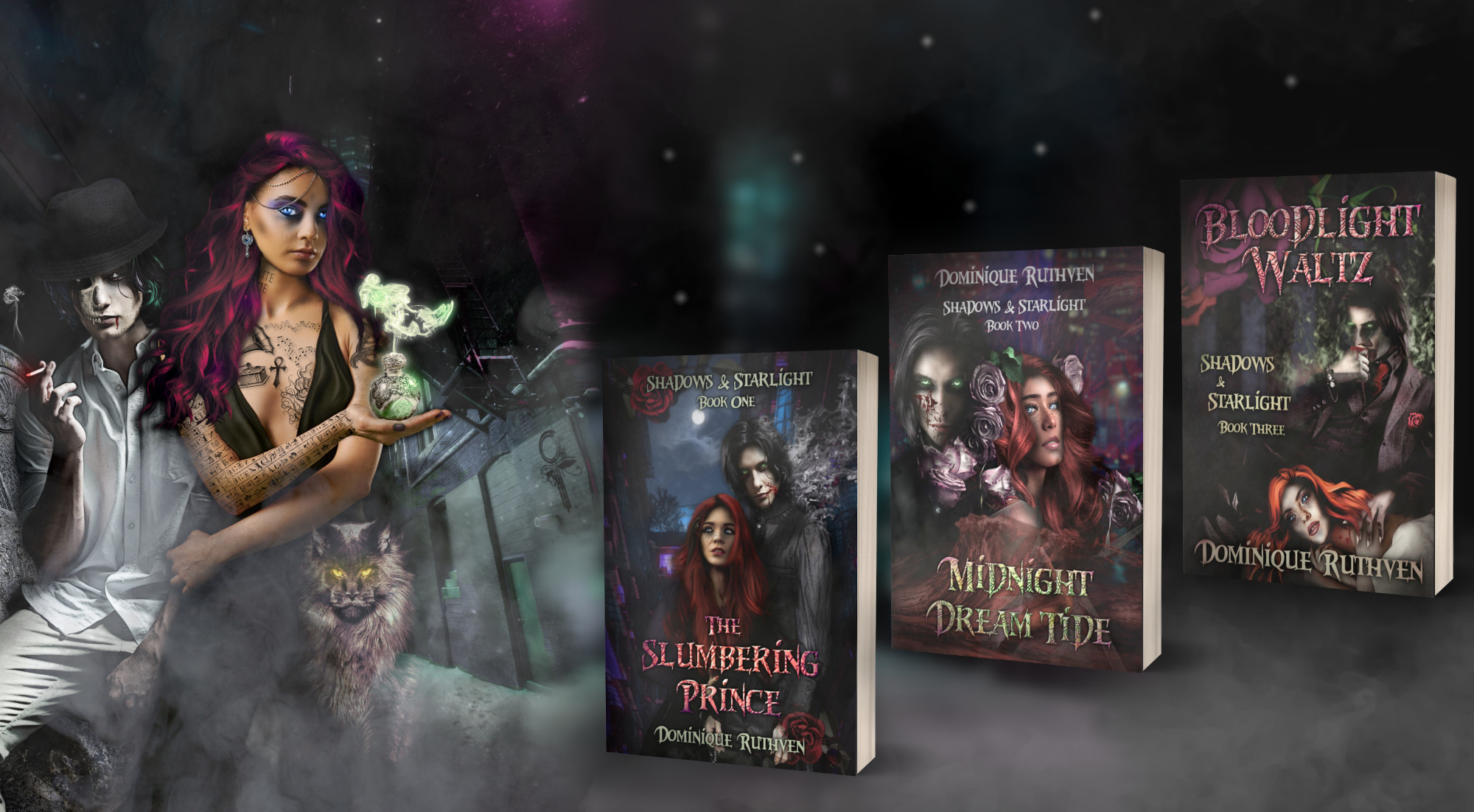
“Raphael?” Ida whispered.
She opened her eyes, but the room had grown dark. Her fingers curled into the blankets beside her; the empty blankets. She slipped off, ignoring the cold, gliding nude out of the room, calling his name. But he didn’t answer.
It was too dark to see. To see the rooms, or the floor, or the walls, for personal items, portraits, books, topiary, something that would tell her a little more of who he was.
One moment she thought she knew, and the next, she was looking for deeper meanings. Where had he come from? Why had he been in that cemetery on the very same night that she’d been married to someone else? Why was he here, when he was in danger? Did he live here? For how long?
Had he been alive all along?
Her head rang with questions. And she’d have asked, but, looking at him, was like staring into the sun. He obliterated all of her concerns. He was the centre of everything, and all she could see was him and his burning edges, his heat.
“Raphael…”
Still no answer.
Her fingers held to the stone walls; her feet took her down the stairs.
They were in a tower, somewhere in Marée. She could hear the river, lapping against the walls on the Northern edge of the building. At least she thought it was north. It was a tower alright. But Raphael was nowhere.
With careful concentration, she took the steep stairs, one by one, until her feet touched the flat ground at the tower’s base. She wasn’t a stranger to the towers of New Babylon. Babylonians liked to build up into the sky. But, she wasn’t at home in them either. Papa’s house was squat and wide, and she liked that. It was filled with air, space, freedom. She was claustrophobic here. Maybe that was just the dark.
There were no lights down here either. There was nothing. Her thighs ached with tension. She felt along the walls to a breeze coming from behind a door. Pushed against it, until it opened and she took a deep, grateful breath.
The night air, early morning sweetness, filled her lungs.
It smelled like heat beginning to rise from the soil. It smelled like sugary flowers and honey and crushed mint. She smiled, stepping into the garden, running her fingers over the petals, and carefully along the long thorns that glared wickedly at her skin, waiting to tear it open. It was a small nature haven buried in a large, high-walled courtyard. The sun would take a long time to get in here. Vines crawled up against the sides, seeking asylum, and the walls were deeply grooved with age and careless neglect.
But where was Raphael?
She stepped further into the garden, down three wide steps that led to nowhere, but a little stone canopy that was draped in wisteria, casting shadows in the early morning glow. The sun hadn’t reached it yet. The sun wasn’t even over the horizon. But if she looked up, the sky was the colour of shallow waters, and she saw a large, stone block in the middle of the canopy, seemingly built out of the stone ground itself. Creepers crept up to cover it, but not completely. A seam was set inches from the top, and Ida ran her fingers along it.
She pushed.
The heavy thing wouldn’t move. But something possessed her to open it, to try harder, some distaste at being denied, and she pushed. A surge of strength rippled through her body, and, as it did, she was hungry again, but she ignored it, smiling in triumph as the block moved, as the seam opened, and the lid slid off, and it crashed to the ground with a sound that made her flinch.
She flexed her fingers, pressing them together to get feeling into them, to rub the pain of exertion away. The stone was hollow, lined inside with velvet, of a blue, indigo, and inside, lay Raphael, asleep.
His face was as burned, as scarred as it had been. His hair, as beautiful, spread over the cushions like it floated into the shallows of the river.
He lay in a sarcophagus.
And for one, terrifying moment, Ida was sure he was dead. Again.
She reached her fingers out to his face, so much more placid now in sleep, unperturbed by how he looked, and she touched the smooth, uninjured cheek, adoration mystifying her. He was, as she’d mused, the sun, and she was blinded. Too much so to see the danger before he struck.
His fingers were on her arm before she saw him move, and she heard a crack. She stared wide-eyed at the corpse, stunned for a second when he opened his storming eyes, and then the pain made her cry out, and try to wrench her arm free. But he was strong. Too powerful, and his fingers tightened, and she was sure she could feel shards of bone grinding together under his grip, unable to do anything but scream and watch in terror as he rose out of the box, his grip pulling her close to him, like a snake tightening its coils around her.
“Stop!” she shrieked.
But the look in his eyes was dead, uncomprehending. They were soulless and, seconds ticked, and Ida knew she couldn’t stop it, it was inevitable.
But then he faltered. Life flared in his eyes. He looked at her, and was suddenly, angry once more. Still, it was better than the dead monstrousness.
He released her, wordlessly, he opened his mouth to speak. He lifted his arm. She thought he might strike her. Defensively, Ida held her arms up, cowering, falling back and away from the sarcophagus. Her eyes were squeezed tightly shut, braced as she was for the beating, her arm throbbing with pain.
But the blow never came, and, instead, arms lifted her, and she smelled Raphael’s cold smell and heard him whisper, “Forgive me, Dolcezza.”
She didn’t dare look at him. She couldn’t open her eyes to face him. His touch was terrifying. Worse: mortifying.
She’d cowered.
There was movement. And each small shifting was a pain in her arm. There was the touch of his lips to her cheek. There was the touch of his tongue to her lips. And then there was blood, and she drank it down, but she felt hot, shameful, horrified, and completely besotted.
And not a single one of those feelings made any sense to her. She didn’t even know where to begin piecing them together.
“You cannot do that again,” he said, after a moment, or many moments.
However much time had passed, it didn’t seem to matter. The sun must have been up, surely. But he wasn’t in the ground, in that tomb, he wasn’t hidden away. But it was dark, yes. Where they were now, a quiet room without windows.
Her eyes opened to slits.
Windowless, and surrounded with books, parchment, quills, a dead hearth.
“I’m sorry,” she said, and she hated the simpering in her voice.
He lifted her chin, but she refused to look at him.
“Ida, please,” he said.
She looked.
His eyes were filled with genuine misery.
“Why do you sleep in that?” she asked, finding her courage from somewhere. She didn’t feel brave. Brave was something she’d left in the water that day when Louka had pulled her in.
“Because it’s safe.”
“I opened it,” she said, in pointed criticism.
He smiled and chucked her chin: “You have had my blood. If I told you to uproot that tree in the garden with nothing but your hands, I am certain you’d make a damn good show of it.”
“And what about the others?”
“What others?”
She looked at him, dead annoyance in her gaze, and he sighed. “I have protection,” he said. “I promise.”
“But-“
He shook his head, looking at her with such intensity that she looked away, swallowing down more questions, more fears.
“I’ve frightened you,” he said, his fingers moving over her hand. But his blood had healed the broken bones, and the pain was nothing more now than a memory of all the pain she’d felt since her first night at Kron Heath.
“You didn’t,” she said.
He laughed slightly.
Ida looked at him a moment, and then sighed, and nodded: “I suppose.”
He lifted her hand and kissed her knuckles before picking her up again.
“I can walk,” she said.
“I know,” he replied but didn’t put her down, carrying her up the stairs into the tower.
“The sun,” she insisted, but he shook his head.
“It can’t hurt me yet.”
He laid her down on the bed, pulling the blankets up around her body and kissing her forehead.
“Sleep,” he said. “It’s been a long night.”
“I don’t want to.” It sounded petulant even to her.
He smiled and pulled something from beside the bed, laying it on her lap as she sat up.
“I thought you might say that,” he said.
She looked at the cover of the book. It was etched with a small ship bobbing on rough waves above a deep blue ocean where a dark shadow lurked, tentacles reaching up as if to take the ship, claim it.
“What’s it called?” she asked the letters a mystery to her.
“‘The Livyatan’,” he said, kissing her head, and leaving her to study the images on its pages until she finally fell asleep with her arms curled around it.

